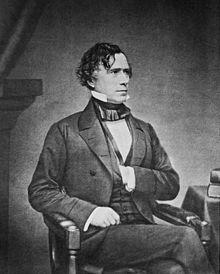

President of the United States
November 23, 1804 Hillsborough, New Hampshire, U.S.
October 8, 1869(1869-10-08) (64) Concord, New Hampshire, U.S.
March 4, 1853 – March 4, 1857
14th president of the United States (1853–57) This article is about the 14th president of the United States. For other people with the same name, see Franklin Pierce (disambiguation). Franklin PiercePortrait by Mathew Brady, c. 1855–186514th President of the United StatesIn office March 4, 1853 – March 4, 1857Vice President William R. King (Mar–Apr 1853) None (1853–1857) Preceded by Millard FillmoreSucceeded by James BuchananUnited States Senator from New HampshireIn office March 4, 1837 – February 28, 1842Preceded by John PageSucceeded by Leonard WilcoxMember of the U.S. House of Representatives from New Hampshire's at-large districtIn office March 4, 1833 – March 3, 1837Preceded by Joseph HammonsSucceeded by Jared W. WilliamsSpeaker of the New Hampshire House of RepresentativesIn office 1831–1833Preceded by Samuel C. WebsterSucceeded by Charles G. AthertonMember of the New Hampshire House of Representatives from HillsboroughIn office 1829–1833Preceded by Thomas WilsonSucceeded by Hiram MonroeTown Meeting Moderator for Hillsborough, New HampshireIn office 1829–1836Preceded by Reuben HatchSucceeded by Amos Flint Personal detailsBorn(1804-11-23 ) November 23, 1804 Hillsborough, New Hampshire, U.S.DiedOctober 8, 1869(1869-10-08) (aged 64) Concord, New Hampshire, U.S.Resting placeOld North Cemetery Concord, New Hampshire, U.S.Political partyDemocraticSpouse(s)Jane Appleton (m. 1834 ; died 1863 )Children3FatherBenjamin PierceRelativesBenjamin Kendrick Pierce (brother)EducationBowdoin CollegeNorthampton Law SchoolProfessionPoliticianlawyerSignatureMilitary serviceAllegiance United StatesBranch/service New Hampshire Militia United States Army Years of service 1831–1847 (Militia) 1847–1848 (Army) Rank Colonel (Militia) Brigadier General (Army) Battles/wars Mexican–American War Battle of Contreras Battle of Churubusco Battle of Molino del Rey Battle of Chapultepec Battle for Mexico City Franklin Pierce (November 23, 1804 – October 8, 1869) was the 14th president of the United States, serving from 1853 to 1857. A northern Democrat who believed that the abolitionist movement was a fundamental threat to the unity of the nation, he alienated anti-slavery groups by supporting and signing the Kansas–Nebraska Act and enforcing the Fugitive Slave Act, yet these efforts failed to stem conflict between North and South. The South eventually seceded and the American Civil War began in 1861. Pierce was born in New Hampshire. He served in the U.S. House of Representatives and Senate until his resignation in 1842. His private law practice was a success, and he was appointed New Hampshire's U.S. Attorney in 1845. He took part in the Mexican–American War as a brigadier general in the Army. He was seen by Democrats as a compromise candidate uniting Northern and Southern interests and was nominated as the party's candidate for president on the 49th ballot at the 1852 Democratic National Convention. He and running mate William R. King easily defeated the Whig Party ticket of Winfield Scott and William A. Graham in the 1852 presidential election. As president, Pierce simultaneously attempted to enforce neutral standards for civil service while also satisfying the diverse elements of the Democratic Party with patronage, an effort which largely failed and turned many in his party against him. He was a Young America expansionist who signed the Gadsden Purchase of land from Mexico and led a failed attempt to acquire Cuba from Spain. He signed trade treaties with Britain and Japan, while his Cabinet reformed their departments and improved accountability, but these successes were overshadowed by political strife during his presidency. His popularity declined sharply in the Northern states after he supported the Kansas–Nebraska Act, which nullified the Missouri Compromise, while many whites in the South continued to support him. Passage of the act led to violent conflict over the expansion of slavery in the American West. Pierce's administration was further damaged when several of his diplomats issued the Ostend Manifesto calling for the annexation of Cuba, a document which was roundly criticized. He fully expected to be renominated by the Democrats in the 1856 presidential election, but was abandoned by his party and his bid failed. His reputation in the North suffered further during the American Civil War as he became a vocal critic of President Abraham Lincoln. Pierce was popular and outgoing, but his family life was difficult. His wife Jane suffered from illness and depression for much of her life and their three children died young. Their last surviving son was killed in a train accident while the family was traveling, shortly before Pierce's inauguration. A heavy drinker for much of his life, Pierce died in 1869 of cirrhosis of the liver. Historians and scholars generally rank Pierce as one of the worst and least memorable U.S. presidents.

We use cookies
We use cookies and other tracking technologies to improve your browsing experience on our website, to show you personalized content and targeted ads, to analyze our website traffic, and to understand where our visitors are coming from. Privacy Policy.